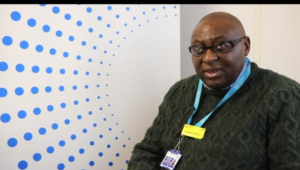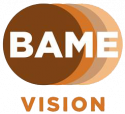
“My children see how hard I work, even with my visual impairment and are inspired by it” – Dr Sylvanus Bisong Effiom
At BAME Vision, we are celebrating Blind and Partially Sighted parents from ethnic minorities with the aim of contributing to the diverse representation of the vision-impaired community. In this series, we are looking to shine a light on parents who work and volunteer, as we find out more about this largely unreported part of society. We will discuss parenting, culture, mental health, support systems, self-confidence, and everything else in between.
This time, in honour of Father’s Day, we had the pleasure of speaking with Dr Sylvanus. He is a blind father of two, and his children are aged between 19 and 21. Dr Sylvanus is from an African ethnic background and has an eye condition called Retinitis Pigmentosa which he has lived with for over 20 years.
How would you describe yourself?
I am a professional with over 35 years of experience working in different sectors, a very dedicated dad of two, and in a blissful marriage.
Since 2003, when I developed my sight impairment, I have been struggling to blend in due to the difficulty of sight loss, raising a family and carrying on with my professional work. I am very involved with equality issues, particularly in the Disability sector. I’ve done some research around the Public Sector Equality Duty and written some articles on that. In general, I am very committed to promoting equality and inclusion not only in employment, but in the wider community.
I have also been involved in the voluntary sector for many years, including roles such as the Secretary to the Management Board of the Organisation of Blind African Caribbeans for over 15 years, served as a Trustee with Citizen’s Advice Bureau which gave me an insight into THE social economic disadvantage in the population, and how this could be tackled. In my current job, I have worked within the legal department, and currently focus on Equality, Diversity and Inclusion (EDI) issues, promoting it or advancing it within the organisation.
It sounds like you are very passionate and involved with your work within EDI, do you find time to take part in any hobbies?
Oh yes, definitely! My greatest hobby is listening to music. I play tennis, with my visual impairment, and I am trying to retrain my skills and abilities at playing the sport. I also enjoy spending time with friends and family whenever possible. In between all of that, I try to make time for some voluntary work also, which is close to my passion and hobbies.
Initially, I believed things were not possible after sight loss, and that I couldn’t play tennis again. However I found an organisation that helped me to rebuild my interests and get me back into the mood.
So culturally, do you feel that people expect something different from you as a vision impaired dad?
This is a very interesting one. Sometimes it can be hard to dissect or understand where certain behaviours are coming from, in terms of the intersectionality of my different identities, such as my disability, race and age. Sometimes it is difficult to know whether it is the disability that trumps over the racial prejudices that I experience, or is it the racial aspect that is much more predominant in the minds of the third party. This is something we should deal with case by case, as the situation arises.
“I think that racism is culturally based, but when compounded with Disability, it becomes a double jeopardy.”
When dealing with people living with a visual impairment from the BAME community, one has to understand that their experience may not be the same as those from other communities because the cultural aspect, the prejudice they experience, tends to overshadow the disability dimension. It is a very complex situation and experience to explain, and sometimes it is easier to understand how it operates by having first-hand experience of it.
Do you think from the perspective of people from the BAME community, or your own culture, they expect something different from you?
Yes. One of the greatest challenges we share as BAME individuals with visual impairment, is the hostility from their own cultures and within their communities. In the African communities, we are coming from a community where visual impairment is not only considered one of the worst form of disabilities, but also an infliction by God. A divine infliction. So from this perspective, the community does not expect anything good from you. Even when you are making commendable efforts to adjust to your circumstances and keep going, you have little to no encouragement from them because their perception is no matter what you do, nothing good is going to come out of it. When it comes from your own family, this has serious ramifications such as social ostracism, negative attitudes and perceptions of failure. You feel it, it is even greater within your local community.
When you go to work, your manager sees you there, you have your assistive technology therefore you can just get on with your work. The psychological aspect and dimension of the experiences of a vision impaired person are not always perceived by those outside of the situation. However, you still have to deal with the daily challenges, in the home environment, maybe your disability is causing dynamic changes, and so on.
On fatherhood and visual impairment
I tried initially when my children were young, to let them feel that difference. I wanted them to grow and normalise my circumstances for themselves, so I tried to do things like play football with my son when he was growing up, allowing him to discover for himself that something is different. So I would not refuse to play football with him, and when he realised that daddy was not following the ball, he started asking questions, then I would explain gradually to him.
By the time I had children, my sight loss had started to develop, so I had taken steps to plan the way I do things at home. As they were growing up, they started to realise that daddy has a particular way of doing things, like the way I keep my drinks, or the way I would make their beds for them, or how I mop the floor. I was very methodical, unlike someone else.
I remember at around the age of 7 or 8, my son started doing some research on glasses. I was seated in the sitting room, and he came downstairs so happy, saying “Daddy! I have seen something that will make you see again! I have seen a website called Specsavers, and they have glasses that will help you!” It was very funny, because his sister who was also there, said “Don’t be silly, daddy will not see with glasses!” My son was confused because he had seen it on the website!
I know it may not have been easy, but they gradually came to understand.
Do you have a Father’s Day tradition?
Yes, every Father’s Day, I take my children out for a special meal. Now that they are in university, I’m sensing that the logistics may be a bit different. They normally get something for me, like a pair of socks or something, you know whatever they can purchase. There is the tradition that on Mother’s Day and Father’s Day, gifts come from the children.
What would you like to say to other blind dads or parents from ethnic minorities out there, and what would your advice be?
There are challenges in our communities of how to perceive our abilities, our visual impairment. One way we can deal with that situation is to focus on building our abilities, rather than focusing on adjusting our disabilities. So if you are in school, make the best out of your abilities and shine. It is we who have to change the perception of visual impairment in our community by making them understand that we can achieve. The one thing which I did, which has had some considerable impact in changing the narrative, is that I did my PhD after I developed my sight loss. I remember when my symptoms started, of course the general consensus within my community was that I was a finished man, there is nothing I can do.
Once I was able to break that negativity and get back to university, they saw the effort I put in and so on. Someone with a visual impairment, they should not let it be a cage. At times it can be a pedestal, in that it can solicit extra support for you, which you can use to enhance and improve coping with your condition.
Additionally, each and every one of us should consider ourselves to be an agent of change, and that it is a necessary responsibility of ours to change the narrative to educate people, through sharing the changes that we ourselves have experienced. We shouldn’t have to tolerate negative perceptions or attitudes, but we can be active agents of change.
Finally, I would like to say, that as we are in a society that is driven by money, we should make ourselves economically active, because if we don’t then we are just compounding our own social and psychological challenges. No matter how little you may think you are doing, get yourself involved with something. It’s not the amount of money you make that will define you, but the effort you put into changing your circumstances that will earn you the respect.
We will talk about this in more detail in the next interview, so no spoilers! Through your volunteer work as well as your professional work, could you briefly tell me what you like most about being a working dad who is also vision impaired?
What I like best is the feeling that I am inspiring and empowering my children by the efforts they see me make on a daily basis. That is very satisfying. The respect they give me is much more heart-warming than if I had my sight and was doing the same thing.
Recently, my daughter sent me a message about how she missed the bus and thought of me. She asked, “If I could miss the bus, then what about my dad? He must go through a lot more” She appreciated the daily challenges I face, and respects me more. I think that that alone is satisfying, in that you are inspiring them, and instilling in them these positive values of resilience, hard work, and determination. They see your challenges, and pick up on the value of patience, persistence and defining your own path, not letting anything get in your way.
Be sure to tune in for part two, where Dr Sylvanus will be joining us to discuss more about his work, the challenges he has faced, and the services he has accessed to support him in his work.
Written by Sylvia Chengo – BAME Vision
